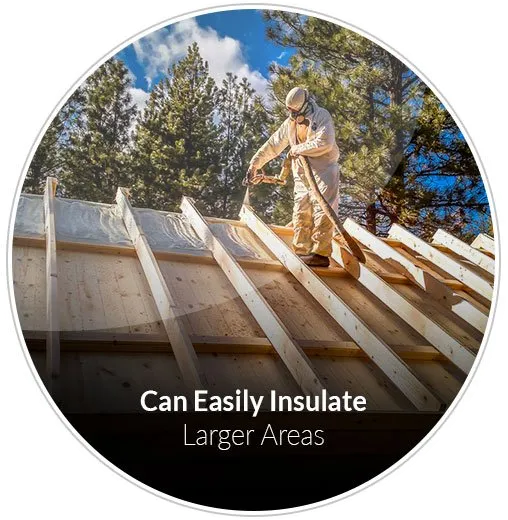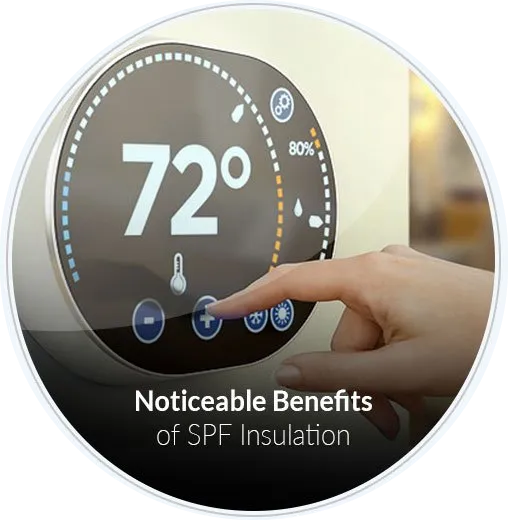Spray Foam Insulation in Tri State Area
Foam Insulation Tri State Area
There is no other comparable home insulating material which can seal your home from air leaks, reduce utility bills, strengthen your home, and help to protect your family’s health from dangerous mold, airborne pollutants, and allergens than Spray Foam insulation.
When it comes to residential and commercial insulation services, Top to Bottom Insulation should be your first and only call.
We have decades of experience in the insulation industry and have worked with thousands of customers on properly protecting their property from harsh temperatures and increasing energy efficiency.
Choose a company that treats their customers like people, not invoices. Call 732-462-7230 for a free estimate.
Functions of Spray Foam Insulation
Spray foam insulation serves more purposes than one might think. Here is just some of the functions that Spray polyurethane foam performs:
Provides an air barrier keeping air from entering or exiting your home and reducing your energy bills. Assists in Moisture Control depending on the type of spray foam insulation you choose. Closed cell spray foam can help form a moisture barrier that keeps dampness from entering your home, thus preventing the growth of mold and mildew. When Used in Roofing spray foam insulation insulates and eliminates thermal bridging through such things as gaps in the decking or various types of fasteners. Helps to Reduce Sound in various rooms of the home.
- Eliminate internal wall condensation problems
- Adhere to any surface
- Reduce the likelihood of mold growth
- Not be use as food source or nesting material for rodents
Spray foam insulation is so versatile that it used in a wide variety of applications. Not only will you find it being used as insulation in walls, ceilings, basements and crawlspaces of homes and commercial buildings, this insulation is also used in trucks, for cold storage, walk-in-coolers, climate controlled buildings and warehouses, boats and ships and much for.
Spray foam insulation also known as Spray Polyurethane foam is made up of a combination of chemicals that when combined becomes a plastic insulation that is applied in liquid foam, expands and then hardens. This foam can expand many times it's volume. In addition, this insulation is so versatile that it can be tweaked in numerous ways in order to create insulation that has many different properties allowing it to meet a multitude of insulation needs. No other type of insulation has this versatility.
While there are spray foam installation kits available installing foam insulation is best left to the experts who are trained and certified in installing this type of insulation. Keep in mind that this insulation is made up of chemicals that you should never breathe in when applying. Professional insulation installers are trained in how to handle these chemicals and the proper gear and safety equipment to use when installing foam insulation.
Spray foam insulation costs are figured by the board foot rather than the square foot. Also closed cell spray foam insulation is more expensive than open cell, but the actual cost of spray foam insulation will depend on the individual properties the insulation has as well as the size of the space that needs to be insulated.
Advantages Of Spray Foam Insulation
If you have been considering having SPF insulation installed in your home, commercial building or truck then you probably know that this type of insulation is extremely effective at providing an insulating barrier. But you may not be aware of all the different advantages this insulation offers. Here is a look at some of those advantages.

SPF insulation is able to fill the smallest cracks and crevices which means that it reduces the number of ports of entry for insects and rodents who want to enter your home. Impeding entry for these little critters helps increase the comfort of your home as well as helps to minimize upkeep when you don't have constantly spray to keep insects at bay.

It is often difficult to insulate larger areas sufficiently using traditional batt, but because spray foam insulation can expand many times this insulation easily covers larger areas with one solid barrier that prevents anything from penetrating between breaks in insulation because there are no breaks.

One of the most noticeable benefits of SPF insulation is the lowering of those energy bills. In many cases, this type of insulation can reduce your heating and cooling bills by 30% to 50% These savings will more than pay for the difference in cost between SPF installation and more traditional batt type insulation.
Reduction of Drafts
If you have ever lived in an old home you know how frustrating it can be to try and keep those drafts from sending chills down your spine in different locations in your home. SPF insulation expands when applied to block those cracks and crevices that are often the source of those drafts. Cutting down on drafts in your home will make your home much more comfortable.
Acts to Reduce Noise
Not only does SPF insulation insulate your home against the cold outside while keeping the warmth inside, it also creates a barrier that helps to reduce noise. This insulation depending on where it is used can block outside noises as well as noises from that home theater or other rooms in the house, resulting in a quieter environment.
Minimizes Air Infiltration
SPF insulation minimizes air infiltration which is a leading cause of spreading mold and mildew spores. By minimizing air infiltration you minimize the opportunity for mold and mildew growth which can cause health problems for you and your family.
Open Cell vs Closed Cell Foam: Which Should I Choose?
Trying to decide what type of spray foam insulation you should use for your jobs? It’s trickier than it seems – though closed cell and open cell foam both insulate a home, they do it in different ways. In this guide we will examine open cell vs closed cell foam and help you pick the best product for your project.
What's the Difference Between Open Cell & Closed Cell?
Open and closed cell foam are two different types of spray foam insulation. They have different strengths and weaknesses, and one is not necessarily better than the other. It comes down to understanding the benefits of open cell vs closed cell foam and choosing the type that fits your needs.
The Cells
A spray insulation is referred to open cell or closed cell because of the difference between the small bubbles (cells) that make up the foam.
Open cell foam is full of cells that aren’t completely encapsulated. In other words, the cells are deliberately left open. This makes the foam a softer, more flexible material.
Closed cell foam is made up of cells that are, as the name suggests, completely closed. The cells are pressed together, so air and moisture are unable to get inside the foam. Because of this, closed cell foam is much more rigid and stable than open cell foam.
Density
Closed cell foam is much denser than open cell foam. Most open cell foam has a density of about .5 pounds per cubic foot. Closed cell foam can be over three times that, with a density of 1.75 pounds per cubic foot or more.
R-Value
A foams R-value is its resistance to heat flow or, in other words, how well they insulate. Closed cell foam has a higher R-value than open cell foam, usually about 6.0 per inch. But some closed cell foams, like Top to Bottom's Closed Cell formula, have even higher ratings that go up to almost 7 per inch. This higher rating makes closed cell foam better at keeping heat in or out of a structure.
Open cell foams have an R-value of around 3.5 per inch. This is significantly lower than closed cell foams, which can limit open cell insulations usefulness in extreme temperature conditions.
Expansion
This is one of the most important differences from an application standpoint. Closed cell foam is designed to expand to about 1″ of thickness when sprayed. With each inch offering an r-value of 7, multiple applications can be applied to achieve higher total r-values. Open cell foam is designed to expand to 3″ of thickness, meaning only one application is possible in most standard walls.
What Do All These Terms & Ratings Actually Mean?
At this point, you might be still be trying to decipher which type of foam insulation is right for your project. Here’s a quick summary of open cell vs closed cell foam strengths and the best applications for each:
Benefits of Closed Cell Foam
Closed cell foam is the best choice for robust insulating where space is an issue, as it can achieve 2x the R-Value of open cell inside a standard wall. Its rigid nature also adds to the structural integrity of the building and E84 fire rated versions are available. The closed cell also acts as a vapor barrier, so water and moisture will be less likely to get inside the home, and the foam itself is unharmed by water damage.
Benefits of Open Cell Foam
One of the biggest benefits of open cell foam is that it expands so much after it has been applied, meaning it can insulate hard to reach nooks and crannies in a home. These types of areas can be hard to insulate with closed cell foam. Open cell foam is excellent for soundproofing where a single application can completely fill the area between studs.
Open cell foam is also much more affordable than closed cell foam, however this foam won’t insulate a house as well as closed cell foam, so it’s not ideal for locations with extreme weather temperatures.
HAPPY CUSTOMERS!
What our customers say
I highly recommend using this company for your insulation needs. Tony was very responsive and the pricing was very fair. The workers were very prompt and efficient. Tony even showed up the day of installation to make sure the job would be completed properly. I am an extremely satisfied customer and will use them again in the future. Thank you Top to Bottom!
Pat Z.
Brandon is amazing at what he does. Our sunroom is fully spray foamed now and we feel the difference big time! Highly recommend these guys
Kenneth M.
Top notch service. Steve is a professional and not pushy at all. Met with him and he gave me all of my options. Had them remove some blow in insulation to start and when ready they will be doing some spray foam. Highly recommend.
Rob L.
In my experience Brendan the owner of Top to Bottom insulation is a hard working, reliable, professional individual who is a pleasure to work with. I recommend him / his company.
Emmet F.
FAQs
What is spray foam insulation?
Spray foam insulation is a versatile material that expands to seal cracks, gaps, and crevices, creating an airtight barrier for superior energy efficiency and comfort.
Why should I choose spray foam insulation over traditional insulation?
Spray foam insulation provides better thermal resistance, prevents air leaks, adds structural strength, and offers long-term energy savings compared to traditional insulation options.
What areas do you serve for spray foam insulation?
Top to Bottom Insulation proudly serves the Tri-State Area, providing premium spray foam insulation for residential and commercial properties.
Is spray foam insulation safe for my home?
Yes, spray foam insulation is safe when installed by trained professionals. We use high-quality materials designed for durability and safety.
How does spray foam insulation improve energy efficiency?
Spray foam insulation creates an airtight seal that reduces energy loss, maintains consistent indoor temperatures, and lowers heating and cooling costs.
Can spray foam insulation reduce noise?
Yes, spray foam insulation provides excellent soundproofing by minimizing noise transmission through walls, floors, and ceilings.
What is the lifespan of spray foam insulation?
Spray foam insulation is incredibly durable and can last for decades with proper installation, ensuring long-term energy efficiency.
How long does it take to install spray foam insulation?
The installation timeline varies by project size, but most residential spray foam installations are completed in one to two days.
Can spray foam insulation be applied in existing homes?
Yes, spray foam insulation can be retrofitted into existing homes, including walls, attics, and crawl spaces, without major construction.
Is spray foam insulation environmentally friendly?
Spray foam insulation reduces energy consumption and greenhouse gas emissions, making it an eco-friendly choice for homeowners and businesses.
FAQs
What is spray foam insulation?
Spray foam insulation is a versatile material that expands to seal cracks, gaps, and crevices, creating an airtight barrier for superior energy efficiency and comfort.
Why should I choose spray foam insulation over traditional insulation?
Spray foam insulation provides better thermal resistance, prevents air leaks, adds structural strength, and offers long-term energy savings compared to traditional insulation options.
Is spray foam insulation safe for my home?
Yes, spray foam insulation is safe when installed by trained professionals. We use high-quality materials designed for durability and safety.
How does spray foam insulation improve energy efficiency?
Spray foam insulation creates an airtight seal that reduces energy loss, maintains consistent indoor temperatures, and lowers heating and cooling costs.
What is the lifespan of spray foam insulation?
Spray foam insulation is incredibly durable and can last for decades with proper installation, ensuring long-term energy efficiency.
How long does it take to install spray foam insulation?
The installation timeline varies by project size, but most residential spray foam installations are completed in one to two days.
Is spray foam insulation environmentally friendly?
Spray foam insulation reduces energy consumption and greenhouse gas emissions, making it an eco-friendly choice for homeowners and businesses.
What is the cost of spray foam insulation?
The cost depends on factors like the size of the area and the type of spray foam used. Contact us for a free estimate tailored to your needs.
Do you offer free estimates for spray foam insulation?
Absolutely! We provide free, no-obligation estimates for all spray foam insulation projects. Contact us today to get started.
How do I schedule a spray foam insulation consultation?
Scheduling is simple! Visit our website at www.toptobottominsulation.com/spray-foam-insulation or call us directly to set up a consultation.
Schedule a Spray Foam Consultation for Your Home!
If you want to make your home more comfortable, insulation upgrades should be a top priority. Call us today at 732-462-7230 or email billing@toptobottominsulation.com for a free estimate today!
Find us
INQUIRE
Contact Us
We will get back to you as soon as possible.
Please try again later.

